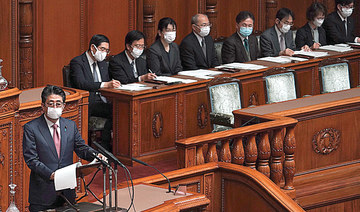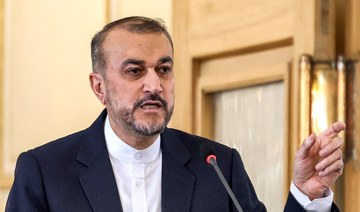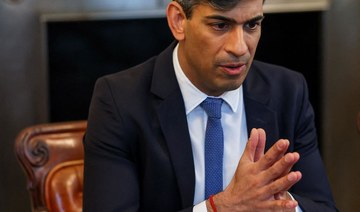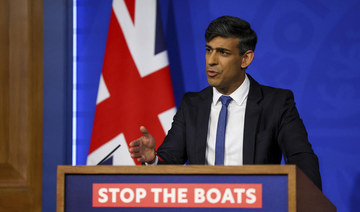TOKYO: Japanese Prime Minister Shinzo Abe on Tuesday declared a state of emergency to fight new coronavirus infections in major population centers and unveiled a stimulus package he described as among the world’s biggest to soften the economic blow.
The state of emergency, giving authorities more power to press people to stay at home and businesses to close, will last through May 6 and be imposed in the capital, Tokyo, and six other prefectures — accounting for about 44 percent of Japan’s population.
“The most important thing now is for each citizen to change our actions,” Abe said in televised comments made at a meeting of a government task force.
“If each of us can reduce contact with other people by at least 70 percent, and ideally by 80 percent, we should be able to see a peak in the number of infections in two weeks,” he said.
The government also approved the stimulus package worth 108 trillion yen ($990 billion) — equal to 20 percent of Japan’s economic output — to cushion the impact of the epidemic on the world’s third-largest economy.
That exceeds the equivalent of 11 percent of US output for the stimulus package laid out by President Donald Trump and 5 percent of output for Germany’s package.
Direct fiscal spending amount to ¥39.5 trillion, or about 7 percent of the economy, more than double the amount Japan spent following the 2008 collapse of Lehman Brothers.
Japan has been spared the big outbreaks of the coronavirus seen in other global hot spots, but a recent, steady rise in infections in Tokyo, Osaka and other areas led to growing calls for Abe to announce a state of emergency.
Coronavirus infections in Tokyo more than doubled to about 1,200 in the past week, with more than 80 new ones reported on Tuesday, accounting for the highest number in the country. Nationwide, cases have climbed past 4,000 with 93 deaths as of Monday.
Abe has stressed that the state of emergency will stop short of imposing a formal lockdown as seen in other countries.
The emergency gives governors the authority to call on people to stay at home and businesses to close. With no penalties for ignoring the requests in most cases, enforcement will rely more on peer pressure and respect for authority.
Tokyo Governor Yuriko Koike said the city was in talks with the central government to decide what types of facilities it would ask to close or curtail business hours, while reiterating there would be no restrictions on buying groceries and medicine.
The government would not ask rail companies to reduce the number of trains in operation, Abe said.
Other essential infrastructure like mail and utilities would operate, as will ATMs and banks, public broadcaster NHK said.
Minister of Agriculture, Forestry and Fisheries Taku Eto called on shoppers to stay calm.
“We are asking citizens to buy only what they need when they need it as there is sufficient food supply and no suspension is planned at food factories,” he told reporters earlier, adding there was no sign of disruption to Japan’s grain imports.
But the restrictions will add to pains the virus is inflicting on the world’s third-largest economy, which is seen as already in recession as supply chain disruptions and travel bans chill factory output and consumption.
Metropolitan Tokyo alone accounts for about 20 percent of Japan’s overall gross domestic product.
Japan will sell a record amount of additional bonds worth more than 18 trillion yen to fund the package, adding to its huge debt which is twice the size of its economy.
While the stimulus could ease the immediate damage from the pandemic, lawmakers are already calling for even bigger spending to prevent bankruptcies and job losses.
Analysts expect the economy, which shrank in the final quarter of last year, to post two more quarters of contraction, piling pressure on the government and the central bank to do more.
“The government will probably compile another supplementary budget soon to stimulate the economy with even more spending,” said Takahide Kiuchi, a former Bank of Japan board member who is now an economist at Nomura Research Institute.
Japan declares coronavirus emergency, approves near $1 trillion stimulus
https://arab.news/7m88w
Japan declares coronavirus emergency, approves near $1 trillion stimulus
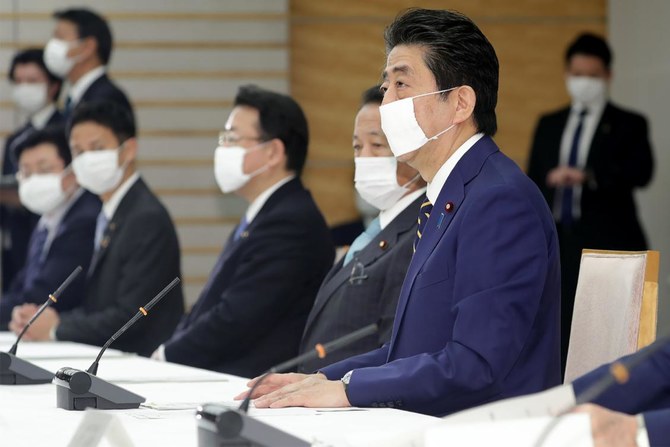
- State of emergency will last through May 6 and be imposed in the capital and six other prefectures
- Coronavirus infections in Tokyo more than doubled to about 1,200 in the past week
Modi accused of hate speech for calling Muslims ‘infiltrators’ at a rally days into India’s election
Modi accused of hate speech for calling Muslims ‘infiltrators’ at a rally days into India’s election

- Congress spokesperson says party has sought action from India’s election commission against Modi
- India’s election code of conduct forbids candidates to “appeal to caste or communal feelings” for votes
NEW DELHI: India’s main opposition party accused Prime Minister Narendra Modi of hate speech after he called Muslims “infiltrators” and used some of his most incendiary rhetoric to date about the minority faith in a campaign rally days after the country began its weekslong general election.
At the rally on Sunday in the western state of Rajasthan, Modi said that when the Congress party was in government, “they said Muslims have the first right over the country’s resources.” If it returns to power, the party “will gather all your wealth and distribute it among those who have more children,” he said as the crowd applauded.
“They will distribute it among infiltrators,” he continued, saying, “Do you think your hard-earned money should be given to infiltrators?”
Abhishek Manu Singhvi, a spokesperson for Congress, called the prime minister’s remarks “deeply, deeply objectionable” and said the party on Monday had sought action from the Election Commission of India, which oversees the six-week voting period. The first votes were cast Friday.
The remarks sparked fierce criticism for peddling anti-Muslim tropes, and for breaking election rules which bar candidates from engaging in any activity that aggravates religious tensions. The Election Commission of India’s model code of conduct forbids candidates to “appeal to caste or communal feelings” to secure votes.
Asaduddin Owaidi, a Muslim lawmaker and president of the All India Majlis-e-Ittehad-ul-Muslimeen party, said on Sunday: “Modi today called Muslims infiltrators and people with many children. Since 2002 till this day, the only Modi guarantee has been to abuse Muslims and get votes.”
Critics of Modi — an avowed Hindu nationalist — say India’s tradition of diversity and secularism has come under attack since his party won power in 2014 and returned for a second term in 2019. They accuse Modi’s BJP of fostering religious intolerance and sometimes even violence. The party denies the accusation and say their policies benefit all Indians.
But rights groups say that attacks against minorities has become more brazen under Modi. Scores of Muslims have been lynched by Hindu mobs over allegations of eating beef or smuggling cows, an animal considered holy to Hindus. Muslim businesses have been boycotted, their homes and businesses have been bulldozed and places of worship set on fire. Some open calls have been made for their genocide.
Modi’s remarks on Sunday were based on a 2006 statement by then-Prime Minister Manmohan Singh of the Congress party. Singh said that India’s lower-castes, tribes, women and, “in particular the Muslim minority” were empowered to share in the country’s development equally.
“They must have the first claim on resources,” Singh had said. A day later, his office clarified that Singh was referring to all of the disadvantaged groups.
Modi and his Hindu nationalist Bharatiya Janata Party are expected to win, according to most surveys. The results come out on June 4.
The Congress party’s president, Mallikarjun Kharge, described Modi’s comments as “hate speech.” “In the history of India, no prime minister has lowered the dignity of his post as much as Modi has,” Kharge wrote on social media platform X.
In its petition to the election commission, the party said that Modi and the BJP have repeatedly used religion, religious symbols and sentiments in their election campaign with impunity. “These actions have been further bolstered by the commission’s inaction in penalizing the prime minister and the BJP for their blatant violations of electoral laws,” it said.
The commission’s code of conduct is not legally binding on its own, but it can issue notices and suspend campaigners for a certain amount of time over violations.
“We decline comment,” a spokesperson for the commission told the Press Trust of India news agency on Monday.
In his speech, Modi also referred to a Hindu nationalist myth that Muslims were overtaking the Hindu population by having more children. Hindus comprise 80 percent of India’s 1.4 billion population, while the country’s 200 million Muslims make up 14 percent. Official data shows that fertility rates among Muslims have dropped the fastest among religious groups in recent decades, from 4.4 in 1992-93 to 2.3 between 2019-21, just a bit higher than Hindus at 1.94.
Modi’s BJP has previously referred to Muslims as infiltrators and cast them as illegal migrants who crossed into India from Bangladesh and Pakistan. Several states run by the BJP have also made laws that restrict interfaith marriage, citing the myth of ” love jihad,” an unproven conspiracy theory that claims Muslim men use marriage to convert Hindu women.
Through it all, Modi has maintained a conspicuous silence, which critics say has emboldened some of his most extreme supporters and enabled more hate speech against Muslims.
French court gives man suspended sentence for Iran consulate intrusion
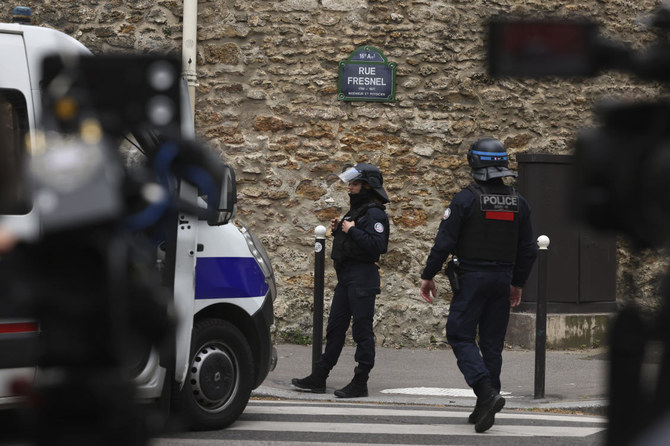
- The court banned him from carrying a weapon or approaching the consulate again
PARIS: A French court this week handed an Iran-born man a suspended 10-month sentence for entering the Iranian consulate in Paris with fake grenades in what he said was “revenge” for a crackdown at home that targeted his family.
The 61-year-old, a long-time resident of France who regularly attends Iranian opposition demonstrations, told the court he acted on Friday after learning the previous day that his sister had been arrested.
He said he had not wanted to “threaten anyone” but rather “take revenge” on the Iranian authorities, who he described as “terrorist.”
The court, in a ruling late on Monday, also banned him from carrying a weapon or approaching the consulate again.
Soldiers and police descended en masse on the neighborhood around the consulate on Friday after the mission reported an intruder entering with a grenade or explosive belt.
But police found no explosives on him or inside after arresting him.
A police source, who did not wish to be named, said the suspect had been wearing a vest with large pockets containing three fake grenades.
The judge said witnesses recounted the man “tearing down flags” and saying he “wanted to die.” Police negotiators managed to convince him to exit the building without his jacket.
A psychiatric expert found the man was of sound mind.
During his trial, the accused embarked on long tirades about the political situation in Iran, prompting the judge to remind him to “stick to the facts.”
The man had already been convicted for setting fire to tires in front of the entrance of the Iranian embassy in Paris in 2023, prosecutors said.
Citizens in the Islamic republic have endured increased repression since nationwide protests began in September 2022.
The demonstrations were sparked by the death in custody of 22-year-old Mahsa Amini, who was arrested for allegedly flouting the mandatory dress rules for women.
Executions — which activists say are a way to instil fear into Iranian society — have also continued apace.
At least 110 people have been executed this year alone, according to the Norway-based Iran Human Rights group.
At least five migrants die in attempt to cross English Channel
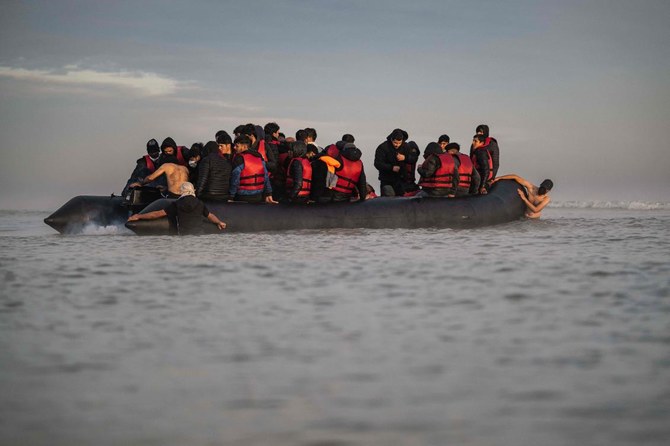
- People smugglers typically overload rickety dinghies, leaving them barely afloat and at risk of being lashed by the waves
PARIS: At least five migrants died in an attempt to cross the English Channel from an area near the French town of Wimereux on Tuesday, police said.
The French coast guard confirmed a police rescue operation had found several “lifeless bodies” following a failed attempt to cross the Channel.
A coast guard spokesperson said its agents were still operating at sea after what the official called a “busy” morning, with several crossing attempts.
The attempts took place after Britain’s upper house of parliament passed legislation on Monday night that will allow the UK government to send asylum-seekers to Rwanda rather than stay in Britain for processing.
Stopping the flow of migrants is a priority for British Prime Minister Rishi Sunak’s government, which says the Rwanda plan will act as a deterrent. Human rights groups and other critics say it is inhumane.
La Voix du Nord newpaper said about 100 migrants had been rescued early on Tuesday, with three helicopters and several rescue boats taking part in the operation.
Tens of thousands of migrants — many fleeing wars and poverty in Africa, the Middle East and Asia — have reached Britain in recent years by crossing the Channel in small boats on risky journeys organized by people-smuggling gangs.
The Channel is one of the world’s busiest shipping lanes and currents are strong, making the crossing on small boats dangerous.
The people smugglers typically overload the boats, leaving them barely afloat and at risk of being lashed by the waves as they try to reach British shores.
Asia hit hardest by climate, weather disasters in 2023— UN
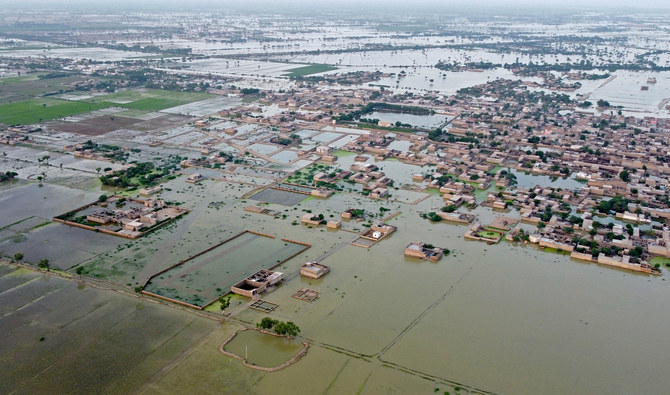
- Climate change exacerbated severity of weather disasters last year, sauys World Meteorological Organization
- 79 disasters, mostly floods and storms, associated with water-related weather hazards were reported in Asia in 2023
Geneva: Asia was the world’s most disaster-hit region from climate and weather hazards in 2023, the United Nations said Tuesday, with floods and storms the chief cause of casualties and economic losses.
Global temperatures hit record highs last year, and the UN’s weather and climate agency said Asia was warming at a particularly rapid pace.
The World Meteorological Organization said the impact of heatwaves in Asia was becoming more severe, with melting glaciers threatening the region’s future water security.
The WMO said Asia was warming faster than the global average, with temperatures last year nearly two degrees Celsius above the 1961 to 1990 average.
“The report’s conclusions are sobering,” WMO chief Celeste Saulo said in a statement.
“Many countries in the region experienced their hottest year on record in 2023, along with a barrage of extreme conditions, from droughts and heatwaves to floods and storms.
“Climate change exacerbated the frequency and severity of such events, profoundly impacting societies, economies, and, most importantly, human lives and the environment that we live in.”
The State of the Climate in Asia 2023 report highlighted the accelerating rate of key climate change indicators such as surface temperature, glacier retreat and sea level rise, saying they would have serious repercussions for societies, economies and ecosystems in the region.
“Asia remained the world’s most disaster-hit region from weather, climate and water-related hazards in 2023,” the WMO said.
The annual mean near-surface temperature over Asia in 2023 was the second highest on record, at 0.91 degrees Celsius above the 1991-2020 average, and 1.87 C above the 1961-1990 average.
Particularly high average temperatures were recorded from western Siberia to central Asia, and from eastern China to Japan, the report said, with Japan having its hottest summer on record.
As for precipitation, it was below normal in the Himalayas and in the Hindu Kush mountain range in Pakistan and Afghanistan.
Meanwhile southwest China suffered from a drought, with below-normal precipitation levels in nearly every month of the year.
The High-Mountain Asia region, centered on the Tibetan Plateau, contains the largest volume of ice outside of the polar regions.
Over the last several decades, most of these glaciers have been retreating, and at an accelerating rate, the WMO said, with 20 out of 22 monitored glaciers in the region showing continued mass loss last year.
The report said 2023 sea-surface temperatures in the northwest Pacific Ocean were the highest on record.
Last year, 79 disasters associated with water-related weather hazards were reported in Asia. Of those, more than 80 percent were floods and storms, with more than 2,000 deaths and nine million people directly affected.
“Floods were the leading cause of death in reported events in 2023 by a substantial margin,” the WMO said, noting the continuing high level of vulnerability of Asia to natural hazard events.
Hong Kong recorded 158.1 millimeters of rainfall in one hour on September 7 — the highest since records began in 1884, as a result of a typhoon.
The WMO said there was an urgent need for national weather services across the region to improve tailored information to officials working on reducing disaster risks.
“It is imperative that our actions and strategies mirror the urgency of these times,” said Saulo.
“Reducing greenhouse gas emissions and adapting to the evolving climate is not merely an option, but a fundamental necessity.”
UN officials urge UK to reconsider plan to transfer asylum seekers to Rwanda
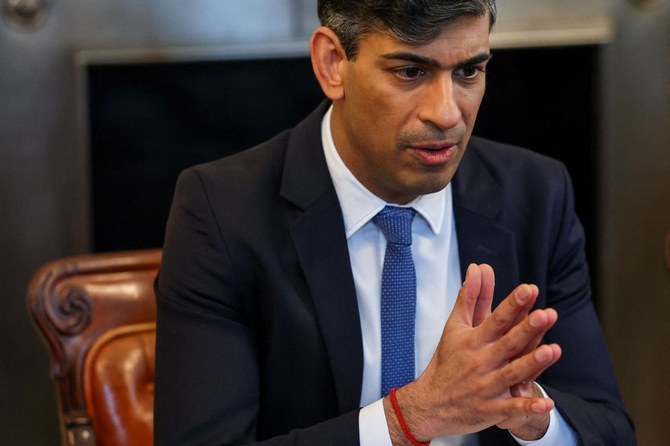
- UN called on the UK to instead take practical measures to address irregular flows of migrants and refugees
GENEVA: Two United Nations top officials on Tuesday called on the UK to reconsider its plan to transfer asylum seekers to Rwanda, warning the move would have a harmful impact on human rights and refugee protection.
In a joint statement, Filippo Grandi, the UN High Commissioner for Refugees, and Volker Turk, the UN High Commissioner for Human Rights, called on the UK to instead take practical measures to address irregular flows of migrants and refugees.
“The new legislation marks a further step away from the UK’s long tradition of providing refuge to those in need, in breach of the Refugee Convention,” said Grandi.
Turk, who has criticized the plan before, said that the legislation “seriously hinders the rule of law in the UK and sets a perilous precedent globally.”
British Prime Minister Rishi Sunak promised on Monday to start sending asylum seekers to Rwanda within 10 to 12 weeks as the upper house of parliament passed legislation that had been delayed for weeks by attempts to alter the plan.
Other countries are considering tough measures to stem illegal migration, with Italy planning to build reception camps in Albania for thousands of migrants arriving by sea.




